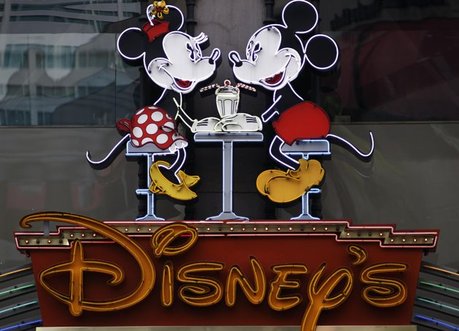Disney has become the first major US media company to announce a wide-ranging ban on junk food advertising across its television, online and radio networks.
The company said that the "significant undertaking" was part of its work with parents to "inspire kids to lead healthier lifestyles" and tackle America's growing problem of child obesity.
All food and beverage products advertised, sponsored or promoted on the Disney Channel, Disney XD, Disney Junior, Radio Disney and Disney-owned online destinations aimed at younger children will be required to meet Disney's nutrition guidelines by 2015.
These guidelines are said to be indexed to US Federal standards, and involve promotion of fruit and vegetables, over products high in saturated fat, sodium and sugar.
Disney is expected to see a slight dip in advertising revenue from the move, as producers of junk food and sugary drinks are understood to spend more than $1bn (£650m) a year on ads directed at children under 12 years.
But US First Lady Michelle Obama described Disney's initiative as a "game changer" for the health of American children.
"This is a major American company - a global brand - that is literally changing the way it does business so that our kids can lead healthier lives," she said.
"With this new initiative, Disney is doing what no major media company has ever done before in the US - and what I hope every company will do going forward.
"When it comes to the ads they show and the food they sell, they are asking themselves one simple question: 'Is this good for our kids?'"
Disney first established its nutrition guidelines in 2006, governing all licensed meals and snacks served at its parks and resorts. This involved all children's meals automatically being served with nutritious sides and beverages, unless the parents "opt out".
The company said of the more than 12 million kids' meals served last year at its parks in the US, parents stuck with the healthier options six out of 10 times.
Disney said that it will enhance its "breakthrough efforts" by further reducing sodium in kids' meals and introducing new well-balanced kids' breakfast meals.
It has also created a "Mickey Check" system that flags up nutritious food and menu items in stores, online and restaurants at its US parks and resorts.
"We're proud of the impact we've had over the last six years," said Robert A Iger, the chairman and chief executive of The Walt Disney Company.
"We've taken steps across our company to support better choices for families, and now we're taking the next important step forward by setting new food advertising standards for kids.
"The emotional connection kids have to our characters and stories gives us a unique opportunity to continue to inspire and encourage them to lead healthier lives."
By 2015, advertising of any cereals with 10 grams or more of sugar per serving, or a full meal with over 600 calories, would not be advertised on its networks, said Disney.
Sugary drinks and high sodium products would also be banned, the company added.
The move has been met with some scepticism, including fears that Disney may be using it as a PR stunt.
But campaigners have also recognised that it is a potentially positive step in the fight against unhealthy lifestyles, as recent studies show that almost a third of American children are overweight or obese.
A separate report issued in February claimed that British children are still being exposed to the same level of junk food ads despite tighter regulations being imposed by regulator Ofcom.

